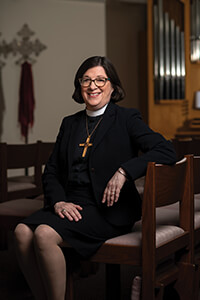From cradle to grave
November 30, 2018
Christmas comes at a descending time. The old year is coming to an end, the new year is not yet here. It is too late to accomplish goals set on the previous New Year’s Day, and just enough time to realize that whatever shape or state you are in will be the shape or state in which you end the year. There is a hefty dose of “what might have been.”
In the Northern Hemisphere the trees are bare, fields are barren, birds have migrated, animals are hibernating, the days are short and the nights are long. The earth’s colors are muted, and when there is snow the world becomes silent. Sometimes during these short days and long nights I find myself thinking about the brevity of life. This conflicts with my tendency to believe that the possibility of self-improvement and renewal is limitless: there is always another day, more time, another chance.
I remember watching our first child as she slept in her cradle, thinking about the future before her and, at the same time, the reality that there would be an end. The Ash Wednesday declaration, “Remember that you are dust and to dust you shall return,” became more pointed and more poignant. The cradle-to-grave progression is our path; the inevitable and inexorable decline of our strength.
As for mortals, their days are like grass; they flourish like a flower of the field; for the wind passes
over it, and it is gone, and its place knows it no more (Psalm 103:15-16).
Maybe this is why the Christmas season can be so fraught. Of course, there is anticipation and celebration, but there is also pressure and stress. Perhaps we are trying to greet the Lord’s birth with our best efforts (when I was a girl, Christmas preparations were not complete until the silver was polished, and that job fell to me), but desperation can creep into the urgency to get Christmas right, to hold back the night. “The hopes and fears of all the years are met in thee tonight” (Evangelical Lutheran Worship, 279). This is freight that Christmas can’t carry when Christmas depends on us.
Christmas comes at an opportune time. God did not come to us that first Christmas when we were at the top of our game or when the world was perfect. Even the circumstances of Jesus’ birth were a sharp reminder that all was not well—forced migration to Bethlehem, no room for the young family, born in a stall. Emmanuel—God with us—came to us and comes to us precisely at the time when our need is greatest.
Our attempts to bring about perfection actually get in the way of receiving the gift. When we try to fit into an unrealistic ideal of who we ought to be instead of welcoming God into our real self, no matter how messy, what then is left on the 13th day of Christmas? Fatigue, certainly, but also the dull acceptance that life moves from cradle to grave.
But on Christmas, God has reversed the cradle-to-grave progression. The angel announced to the shepherds: “I am bringing you good news of great joy for all the people: to you is born this day in the city of David a Savior, who is the Messiah, the Lord. This will be a sign for you: you will find a child wrapped in bands of cloth and lying in a manger” (Luke 2:10-12).
Here is the new reality. Here is the truth. Our lives are not a meaningless trudge from cradle to grave, but a joyful journey—true and lasting joy—from grave to cradle. All our brokenness and death meet life and healing and hope in the child in the manger. His cradle defeats the grave. We are loved. We are alive. Now we are free to greet this holy season.
Merry Christmas, dear church.
A monthly message from the presiding bishop of the Evangelical Lutheran Church in America. Her email address: bishop@elca.org.


